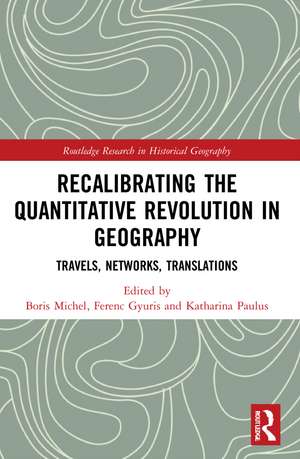Recalibrating the Quantitative Revolution in Geography: Travels, Networks, Translations: Routledge Research in Historical Geography
Editat de Ferenc Gyuris, Boris Michel, Katharina Paulusen Limba Engleză Paperback – 29 ian 2024
This book will be of interest to researchers, postgraduates and advance students in geography and those interested in the spatial sciences.
| Toate formatele și edițiile | Preț | Express |
|---|---|---|
| Paperback (1) | 325.35 lei 3-5 săpt. | +18.51 lei 7-13 zile |
| Taylor & Francis – 29 ian 2024 | 325.35 lei 3-5 săpt. | +18.51 lei 7-13 zile |
| Hardback (1) | 1002.50 lei 6-8 săpt. | |
| Taylor & Francis – 18 mai 2022 | 1002.50 lei 6-8 săpt. |
Preț: 325.35 lei
Nou
Puncte Express: 488
Preț estimativ în valută:
62.25€ • 64.100$ • 51.52£
62.25€ • 64.100$ • 51.52£
Carte disponibilă
Livrare economică 15-29 martie
Livrare express 01-07 martie pentru 28.50 lei
Preluare comenzi: 021 569.72.76
Specificații
ISBN-13: 9780367640873
ISBN-10: 0367640872
Pagini: 242
Ilustrații: 40
Dimensiuni: 156 x 234 x 18 mm
Greutate: 0.35 kg
Ediția:1
Editura: Taylor & Francis
Colecția Routledge
Seria Routledge Research in Historical Geography
Locul publicării:Oxford, United Kingdom
ISBN-10: 0367640872
Pagini: 242
Ilustrații: 40
Dimensiuni: 156 x 234 x 18 mm
Greutate: 0.35 kg
Ediția:1
Editura: Taylor & Francis
Colecția Routledge
Seria Routledge Research in Historical Geography
Locul publicării:Oxford, United Kingdom
Public țintă
Postgraduate and UndergraduateCuprins
1) Introduction: Recalibrating the quantitative revolution in geography 2) In the footsteps of the quantitative revolution? Performing spatial science in the Netherlands 3) Geographies of quantitative geographies in Brazil: two versions of a revolution 4) Translation of quantitative geography in the Brazilian journals: the cases of the Boletim Geográfico 1966-1976) and Revista Brasileira de Geografia (1970-1982) 5) Digitality: origins, or the stories we tell ourselves 6) Multivariate functions: heterogeneous realities of quantitative geography in Hungary 7) A social history of quantitative geography in France from the 1970s to the 1990s: an overview of the blossoming of a multifaceted tradition 8) How landscape became ecosystem: the nature of the quantitative revolution in German geography 9) The urban revolution: how thinking about the city in 1920s German geography prepared the field for thinking about quantification and theory 10) A revolution in process: longue Durée and the social history of the increase in numerical data from the Brazilian Institute of Geography and Statistics and the National Geography Council before the "quantitative revolution" (1938-1960) 11) Italian geographers and the origins of a quantitative revolution: from natural science to applied economic geography 12) The early years: William Bunge and Theoretical Geography 13) Mathematics against technocracy: Peter Gould and Alain Badiou 14) Conclusion: a virtual discussion about the quantitative revolution’s legacy for past, present, and future
Notă biografică
Ferenc Gyuris is an associate professor of geography at ELTE Eötvös Loránd University, Faculty of Science, Institute of Geography and Earth Sciences, Department of Social and Economic Geography in Budapest, Hungary.
Boris Michel is a professor of geography at Martin Luther University in Halle, Germany.
Katharina Paulus is a PhD student at the Institute of Geography, Friedrich-Alexander University in Erlangen-Nürnberg, Germany.
Boris Michel is a professor of geography at Martin Luther University in Halle, Germany.
Katharina Paulus is a PhD student at the Institute of Geography, Friedrich-Alexander University in Erlangen-Nürnberg, Germany.
Descriere
This book brings together international research on the quantitative revolution in geography. It offers perspectives from a wide range of contexts and national traditions that decenter the Anglo-centric discussions.
















